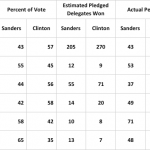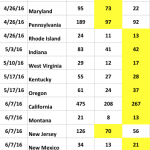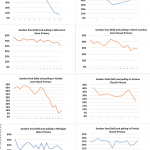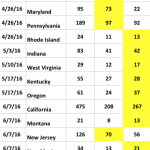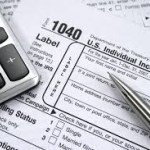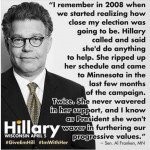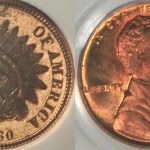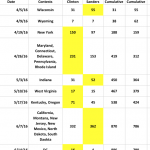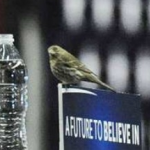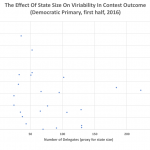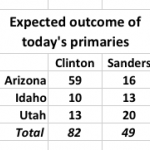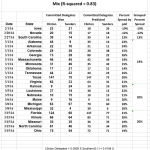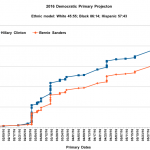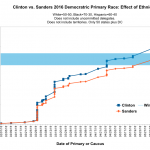Bernie Sanders
Since 1968, about 17 candidates ran in Democratic primary races and earned enough votes (above about 20% all told) to count as having been contenders.
Of those, one was murdered, one was shot but lived, one was eliminated from competition by GOP dirty tricks, and one left the race because of insufficient support but would probably have been exposed as having two families (that would have been a scandal) had he stayed in the race.
Putting this another way, there is about a 24% chance that a Democrat running in a primary will be taken out of the race for extrinsic reasons.
Given the stakes…
And, how did my model do?
There was a lot of talk about California, and a lot of back and forth, but in the end I stuck with my original model to predict the outcome of that race. See the table above for the results, but the bottom line is that I predicted that Clinton would get 57 percent of the votes and Sanders 43 percent. It turns out that Clinton got 57 percent and Sanders got 43 percent.
Excuse me for a moment while I bask in the bright light of being-right-ness.
Thank you. Now, on to the details.
First, a quick, note on the numbers and methods. All my percents (for prediction and…
First, Sanders lost Nevada because Hillary Clinton won the caucus.
Then, the Sanders campaign put their ground game into effect, in an effort to overtake Clinton during the nearly-unique-to-Nevada process that allows for changes in pledged delegates at later caucuses. But he didn't get enough delegates to achieve that. The Sanders campaign does get credit for getting more delegates than they had before, of course.
Then, at the State Convention, Sanders had enough delegates in place to gain a couple of more delegates and possibly tie with Clinton in the end. But the organizers for the Sanders…
Between now and the end of the primary season, I expect Sanders to pick up more delegates than Clinton, in total, by a very small margin.
On Tuesday, April 26th, there will be primaries in Connecticut, Delaware, Maryland, Pennsylvania and Rhode Island. That's 384 pledged delegates at stake.
Polls put Clinton ahead in all these states, but not all the polls are current and not all the Clinton leads are strong.
Added Note:
I noticed some very strong reactions in the comments section from people apparently (but not very clearly) accusing me of making up numbers to make it look like Sanders…
I don't know yet, but as soon as I do, I'll post that below.
With 98.5% of the delegates counted, Clinton won 57.9% of the vote, Sanders 42.1%. This puts Clinton at 139 delegates, very close to my prediction of 137.
Clinton closing in on 57%, or about 140 delegates.
If that holds, this is pretty much of a shellacking for Sanders. Sanders out spent Clinton on ad buys, has campaigned heavily, and has set the expectations as a definitive win. This is Sanders home state (of birth, not representation). Yet he seems to have definitively lost. This will put Sanders even more behind in the…
As you know, I've been applying a model to predict the outcome of each of the Democratic Primary contests, and have done pretty well at predicting results.
All of the future contests are primaries, not caucuses. It turns out that the two modes have very different patterns. Many have suggested that this has to do with how the process works, and somehow caucuses, or open contests, favor Sanders, who has won several. However, it also turns out that caucusing is a northern thing (and Sanders does somewhat better in the north, or more accurately perhaps, rarely wins in the south). Caucusing is…
A while back Vox produced a tax modeler that would tell you how your taxes would change with Sanders plan. It raised most people's taxes by a few thousand dollars. But the modeling was misleading because the same plan would probably reduce health care costs for those same individuals.
I pointed that out back at the time but most of the response to me pointed out was the ridiculous recitation of completely wrong information (from both sides of the debate) so I dropped it because it really doesn't matter. President Sanders or President Clinton would not produce any tax plans. Not their job.…
The important thing first.
I predicted who would win the Wisconsin primary, although my prediction suggested that Sanders would do better than he did. (He underperformed.) I predicted the outcome of the Wyoming primary exactly.
These are the most recent two in a long series of mostly correct predictions of which Democratic candidate will win each of the contests in this long presidential primary season. My predictions of which candidate would win have been mostly accurate, but also, fairly accurate with respect to how many delegates each candidate would pick up.
Several primaries back, for…
In January, Hillary Clinton still possessed the benefit of the doubt. Memories of her and Bill snarling at Barack Obama in 2008 had faded, and despite her long and dreadful record, it's always possible to turn over a new leaf. But Clinton's ongoing response to Bernie Sanders shows why she is unfit for the presidency. Even as the frontrunner, Hillary shows no leadership ability; she, too, follows Sanders, trailing him to the left as he takes meaningful positions on issues like income inequality and campaign finance reform. Her saccharine smile says "I can do that too!" but truly she should be…
We are in the Primary Doldrums. For the last several days and the next several days, there is not too much happening, big gaps between the action. Wisconsin is important, and it is Tuesday, Then Wyoming by itself, then New York by itself, then a sort of Super Tuesday with several states.
As you know I've created a multivariable model that has a good record of predicting primary and caucus outcomes in the contests between Hillary Clinton and Bernie Sanders. For the rest of the primary season, this is what it looks like.
I used yellow highlighting to indicate who is expected to win the…
You all know this happened.
But there is some controversy over what kind of bird it is.
There is no doubt whatsoever that the bird was a finch. However, what kind? Most likely a house finch, because they are common, and the most likely to live in a big auditorium thingie and not be fearful of people.
A pic of the bird is above. Here is another:
What do you think it is?
Bernie Sanders has either stated or implied two features that make up his strategy to win the Democratic nomination to be the party's candidate for President this November.
Implied, sort of stated: Convince so-called "Superdelegates" (properly called "uncommitted delegates") in states where he has won to vote for him, even if he is in second. That is a good idea, and if the two candidates are close, it could happen. However, when I run the numbers, giving Bernie "his" uncommitted delegates and Hillary "her" uncommitted delegates, it is pretty much a wash. The uncommitted delegates are not…
This post was written in two parts, pre-primary and post-primary. To see the result and a discussion of what they mean, skip down to the last part of the post, where I'll discuss why Tuesday's results may mean that Sanders could win the primary.
Pre-Primary
As already discussed, Clinton is likely to win the Democratic nomination. Sanders is too far behind to catch up without extraordinary results, as outlined here. However, it is also true that Sanders is likely to win a majority of contests from here on out, while at the same time, Clinton is likely to win many (if not most?) of the actual…
Almost exactly 50% of the votes have been cast in the Democratic Party primary and caucus process. I've been updating a model to predict primary and caucus results all along, and the model has done fairly well. The most recent update, however, was a bit off. That update involved separating states into two groups, southern vs northern, then calculating different sets of likely voting patterns by ethnicity for those two groups, and integrating that with estimates of ethnic distribution ("white, black, hispanic") among Democratic voters by state.
What I did not do in those models was to…
As you know, I developed a simple model for projecting future primary outcomes in the Democratic party. This model is based on the ethnic mix in each state, among Democratic Party voters. The model attributes a likely voting choice to theoretical primary goers or causers based on previous behavior by ethnicity. Originally I made two models, one using numbers that the Clinton campaign was banking on, and one using numbers that the Sanders campaign was banking on.
The results of the Super Tuesday primaries demonstrated that the Sanders-favoring model does not predict primary outcomes.…
One of the most frequent claims of supporters of so-called "complementary and alternative medicine" (CAM), which goes by the Orwellian name "integrative medicine," is that it represents "integrating" alternative medicine with science-based medicine to produce the "best of both worlds." Of course, when I think of the best of both worlds, I usually think of The Best of Both Worlds, which might well be appropriate, except that, unlike the case when the Borg assimilate a species, when science-based medicine is forced to assimilate quackery, the quackery changes it, making it weaker, not stronger…
Both Hillary Clinton and Bernie Sanders are viable candidates to win the Democratic nomination to run for President of the United States.
There are polls and pundits to which we may refer to make a guess as to who will win. Or, we could ignore all that, and let the process play out and see what happens. But, spreadsheets exist, so it really is impossible to resist the temptation of creating a simplistic spreadsheet model that predicts the outcome.
But we can take that a step further and suggest alternate scenarios, based on available data. So I did that.
I have removed the so called "Super…
by Anthony Robbins, MD, MPA
When Bernie Sanders announced his candidacy for the Democratic nomination for President, I cheered. For the first time in my life, we would know what a candidate for President really believed and what she or he would do. For me, I am doubly pleased, as I agree with Bernie's ideas.
Bernie began his political career in Vermont in the 1970s just as I was beginning my government career in Vermont. By the time he was elected to the House of Representatives in 1990, I had worked in Washington for both the executive branch (National Institute for Occupational Safety and…
